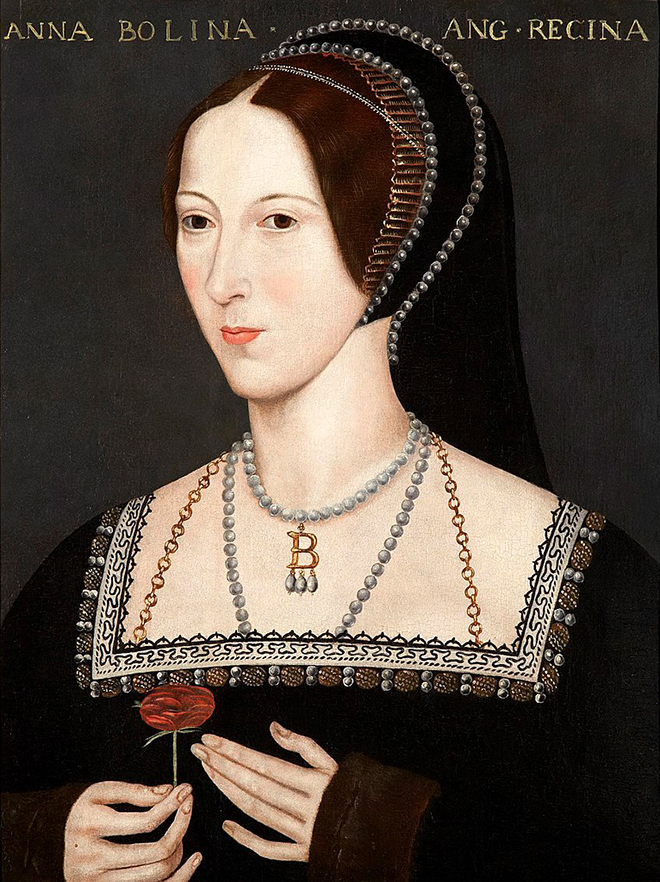ANNE BOLEYN IN HAUGHTY PROSPERITY AND IN HARSH ADVERSITY

[Above: Near contemporary painting of Anne Boleyn at Hever Castle, c. 1550—public domain, Wikimedia File:AnneBoleynHever.jpg]
IN 1533, the press of Wynkyn de Worde issued a tract titled “The Noble Tryumphant Coronacyon of Quene Anne, Wyfe unto the Most Noble Kynge Henry VIII,” boasting of the lavish festivities accompanying the ascendency of Anne Boleyn as Queen Consort of England. Boleyn, a mayor’s daughter and maid-in-waiting to the former queen, Catherine of Aragon, needed tokens of legitimacy. Blaring trumpets, choruses, fountains of wine, finery, mechanical dragons, and ceremonial pomp were a sop to her vanity, a taunt to her still living predecessor, and an in-your-face retort to the common folk who called her “the king’s whore.”
Greedy, haughty, and vindictive, Boleyn would hardly seem likely to bring reformation to religion. She was pious in an external way, but until the very last days of her life, her inner character seemed not at all amended by faith. Nonetheless, because of her, the Reformation got underway in England.
Henry wanted a male heir. Catherine had not provided one and was growing too old to bear children. Henry began to doubt the legitimacy of his marriage—Catherine had, after all, first been married to his elder brother, Arthur (although she swore her first marriage was never consummated). Henry tasked his Lord Chancellor, Cardinal Wolsey, to obtain an annulment from the pope. When Wolsey failed, a powerful coalition engineered his downfall. They did not do this for love of Boleyn, whom they detested, but for hatred of the cardinal.
Thomas Cromwell, who replaced Wolsey as councillor in divorce matters, convinced Henry to break with the pope. “It is true the bishops make oath to your majesty; but they make another to the pope immediately afterwards which absolves them from it. Sire, you are but half a king, and we are but half your subjects.” Before long, Henry saw it Cromwell’s way. He played nice with the pope to get Bishop Thomas Cranmer installed as Archbishop of Canterbury with proper apostolic succession. As soon as Cranmer’s legitimacy was beyond dispute, he granted Henry his divorce, married the king to the now-pregnant Boleyn, and followed the king’s lead in breaking with Rome. Although, in the main, Henry’s observance of Christianity remained Roman Catholic, Cranmer quietly and persistently pushed for “Lutheran” reforms. Boleyn never abandoned the Roman Catholic faith, although she found it expedient to side with the religious reformers who were often her only allies, and who hoped through her to shift the King further from Catholicism. She pleaded for accused reformers, read William Tyndale's Obedience of a Christian Man, and supported dissemination of English language Bibles.
Like Catherine, Boleyn failed to bear a son. Her first-born was a girl, the future Queen Elizabeth I. Afterward she miscarried another child and finally brought forth a premature, stillborn boy. When the king berated her for this, she blamed him because she had undergone a shock at finding him dandling Jane Seymour on his knee, her own recent seat. Henry no longer needed or wanted Boleyn. To the dismay of almost no one except the accused, he brought charges against her for witchcraft, adultery, and incest.
Two tests that reveal a person’s true character are power and adversity. Boleyn had failed the first badly. Her response to the second was alternate fits of despondency and hysterical laughter. But in the end, she proved nobler in the face of death than she had in prosperity. She pleaded for the lives of her alleged paramours and insisted on their innocence.
In her last words to the judges she said,
God has taught me how to die, and he will strengthen my faith....As for my brother and these others who are unjustly condemned, I would willingly suffer many deaths to deliver them; but, since I see it so pleases the king, I shall willingly accompany them in death, with this assurance, that I shall lead an endless life with them in peace.
The peers found her guilty. On this day, 19 May 1536, a skilled executioner, summoned from France, struck the fatal blow that beheaded her. The glitter of her coronation had faded away in three short years.
—Dan Graves
----- ----- -----
For more about that period of the English Reformation and Anne's role, watch God's Outlaw at RedeemTV.
God's Outlaw can be purchased at Vision Video.







